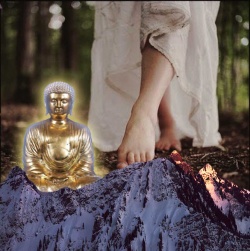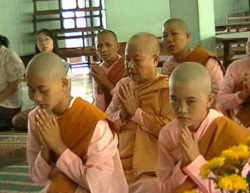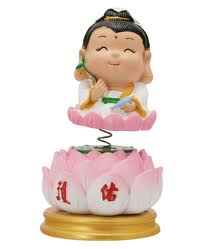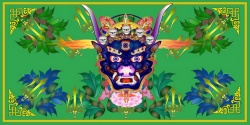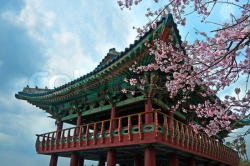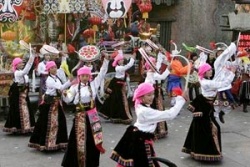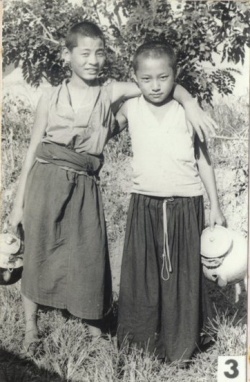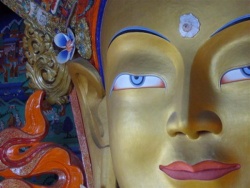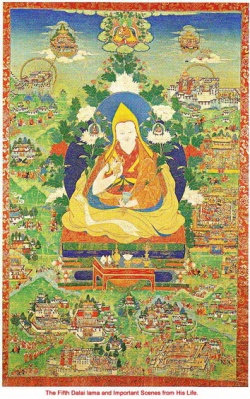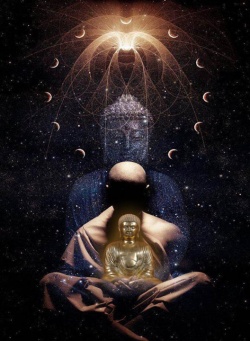Maha Buddhavamsa - Vanquishing Vasavatti Mara (Devaputta Mara)
The Great Chronicle of The Buddhas by Tipitakadhara Mingun Sayadaw
Edited and Translated by U Ko Lay and U Tin Lwin
Vanquishing Vasavatti Mara (Devaputta Mara) before sunset
When the Bodhisatta had taken his seat on the Invincible, Aparajita throne, at the foot of the Maha Bodhi Tree, for realization of Sabbannuta Nana, Sakka came to pay homage and stood blowing the Vijayuttara conch.
(This conch was 120 cubits in length and when once blown, its sound ceased only after four months.)
Pancasikha Deva came to pay homage and stood playing Beluva harp.
Suyama Deva stood waving the yak-tail fly-flap, Santusita Deva stood waving the circular ruby fan, and Sahampati Brahma stood holding the white umbrella, three yojanas in length.
Kala Naga arrived with a company of eighty-thousand female Naga dancers and stood paying homage by chanting hundreds of verses in praise of the Bodhisatta.
All the Devas and Brahmas from the ten thousand world-systems arrived to pay homage with offerings of festoons of very fragrant of flowers, perfumes, scented powder, incense and incense sticks and singing thousands of songs in acclaim.
Mara of Vasavatti Deva world, forsaking his celestial pleasures, had all the time been following closely behind the Bodhisatta during the whole six year period of dukkaracariya,
waiting for the occasion when the Bodhisatta might have wrong or evil thoughts (miccha vitakka) such as sensual desires, (kama vitakka), etc.
But not finding the slightest sign of deviation from the right thoughts on the part of the Bodhisatta, Mara thought to himself thus:
"Now, Prince Siddhattha had arrived at the Bodhi Tree for attaining Buddhahood.
At present, he is striving to escape my domain (of the three worlds of' humans, Devas and Brahmas);
I cannot concede him in any way the opportunity of escaping from the three worlds under my sway".
With this thought, he went to Vasavatti Deva world and, having assembled the fighting forces of Mara, commanded them, "O Men, transform yourself into various frightening forms, and each holding a different weapon proceed quickly to Prince Siddhattha like a huge torrent of water rushing down overwhelmingly";
He himself, followed them, riding on Girimekhala elephant which was 150 yojanas in size and, creating one thousand arms on his body, he held one hundred weapons, each arm grasping a different one.
(The Mara Deva here was not the lawful ruler of the Deva world of Vasavatti.
The Deva king lawfully ruling over Vassavatti was a different deity.
Just like a rebel leader with many followers in the human world, rising in active revolt against the country, looting and committing acts of robbery, the Mara was in fact just a powerful Deva inhabitant of the Paranimitta Vasavatti Deva world, leading an insurgency there with a large retinue of evil Devas, causing great nuisance to humans, Deva and Brahmas in their performance of meritorious deeds.)
The great hordes of Mara advancing on the Bodhisatta were enormous numerically that it was twelve yojanas deep in front of Mara, twelve yojanas wide to his right, twelve yojanas wide to his left, an nine yojanas high above him and in the rear it reached as far as the end of the ten thousand world-systems,
The frightening sounds intimidations, shouting and exclamations of the great armies of Mara could be heard from a distance of one thousand yojanas, just like that caused by an enormous land slide.
Mara, holding one thousand various weapons in his one thousand created arms, and his numerous troops each holding a different weapon, transforming themselves into hideous figures with variegated faces, advanced on the Bodhisatta in order to overpower and destroy him.
When the great armies of Mara were thus advancing towards the Maha Bodhi Tree, not a single one out of those Devas headed by Sakka who bad been there hitherto paying homage to the Bodhisatta, could withstand them; they fled helter-skelter in all directions.
Sakka ran away with the large Vijayuttara conch hung on his back and remained standing on the fringe of the ten thousand world-systems;
Maha Brahma also, throwing away the white umbrella at the edge of the world-systems, went back to the Brahma world; Kala Naga also, abandoning all the Naga dancers dived into the earth, went to the Naga mansion called Manjerika,
five hundred yojanas in size and slept covering his face with the hand; there was not a single Deva or Brahma who dared to remain standing in the neighbourhood of the Bodhisatta and the Maha Bodhi Tree.
At that time, the Bodhisatta remained sitting all alone like great Brahma residing alone inside a secluded mansion.
Bad omens which appear in advance to signal the arrival of Mara
Bad omens appear distinctly in advance to portend the arrival of Mara.
These omens are: Falling of thousands of very violent frightful meteors; falling of total darkness with the rising of haze;
severe quaking of oceans and the great earth; arising of mists in the oceans, flowing of many rivers upstream; falling of mountain tops to the ground; toppling over of trees;
blowing of violent storms and winds; appearance of fearful sounds from these violent storms and winds; vanishing of the sun in the darkness and roaming about in the sky of headless bodies.
When Mara arrived with the clear appearance of these ominous signs, the Bodhisatta remained seated courageously without the least fear, like the bird king Garuda in the midst of birds or like the lion king Kesaraja amidst beasts.
Even as the aforesaid inauspicious omens were appearing, Mara arrived but remained standing being unable to enter the immediate vicinity of the Maha Bodhi Tree (Maha Bodhi mandala).
Not daring to make an approach, Mara's great armies kept the Bodhisatta surrounded from all sides.
Viewing his hordes, Mara could just give them command, "Come on! Seize him!", but he himself was unable to go anywhere near the Maha Bodhi Tree just as a fly was incapable of approaching a piece of red hot iron.
He said to his hordes, "O men, there is not a single person to match this Prince Siddhattha the son of King Suddhodana; we are unable to make a frontal attack on him; we shall attack this Prince Siddhattha from the rear".
On surveying the three sides, the front and left and right, of him, the Bodhisatta did not see anything but emptiness since all the Devas and Brahmas had fled.
Then seeing the Mara's troops advancing to overrun him from the northern side, he thought to himself thus:
"Such overwhelming numbers of Mara's troops are making great efforts with the sole object of attacking me; there is neither my mother nor father, nor my brother nor any other relatives of mine here at this place.
Only the Ten Perfections which I have so long developed and nurtured will serve me as my companions and retinue;
so relying only on these comrades of mine, the Ten Perfections, it will be proper to destroy these hordes of Mara by attacking them with my Parami weapons".
Then he remained reflecting on the meritorious deeds of his ten Perfections.
Mara's attack by discharging nine kinds of missiles
While the Bodhisatta was thus reflecting on meritoriousness of his ten Perfections, Mara was planning, "By discharging nine kinds of missiles, I will force the Prince Siddhattha to flee"
(1) First he let loose a violent cyclone. Immediately, the east wind, the west wind, the south wind and the north wind started rising in force;
and although they were capable of breaking up and blasting away mountain tops of sizes measuring a half yojana, one yojana two or three yojanas, and of uprooting trees and jungle bushes;
and also of pulverizing villages and towns in the surrounding area, they became powerless on coming near the Bodhisatta and were incapable of even ruffling the edge of his robe on account of the glory and power of the Bodhisatta's deeds of merit.
(2) Mara expectedly looked about with the thought, "By this time, the recluse Gotama should have been carried away by the storm missile discharged by me and dashed against 'Cakkavala' mountain into smithereens."
He became much troubled in mind on seeing the Bodhisatta seated as he was, unshaken like a firmly erected gate post.
And so intending, 'I will kill him by drowning in the very strong currents of water", he made the rain clouds rise in a moment and a torrential rain fall.
This great earth turned into a hollow depression by the force of the rainfall thus commanded by Mara Deva.
When this torrent of water, after eroding and overflowing the fringe of forests and hills and trees, reached near the Bodhisatta, it was incapable of even wetting a single thread of his robe; it changed its course and flowed away elsewhere without touching the Bodhisatta.
(3) On seeing the said phenomenon, Mara, intending, "I will turn this Prince Siddhattha into dust by hitting with stones", caused to fall the rain of stones.
Stones of very large sizes came rolling through the sky like huge mountain tops, sending off flames of dust; on nearing the Bodhisatta, they got transformed into big celestial garlands and balls of flowers.
(4) Thereafter, with the thought, "I will cause death to this Prince Siddhattha, I will kill him, by making mince meat of him", he let fall the rain of weapons.
All kinds of weapons such as single-edged and double-edged spears and knifes, etc., emitting flumes and flames came flying through the sky area only to fall in the form of jasmine flowers, etc. in the Maha Bodhi area.
(5) Although Mara had intended, "Prince Siddhattha will become like a heap of minced meat", he was struck with wonder when he saw Prince Siddhattha seated as before without being destroyed like a huge diamond mountain. So he again caused live coals to rain down .
They came falling down smoking and blazing but got transformed into jasmine flowers etc. on coming near the Bodhisatta.
(6) Thereafter, he caused hot ashes to rain down.
The mass of ashes vesy hot like fire came down from the sky but turned into celestial sandalwood powder as they reached the feet of the Bodhisatta.
(7) Again he caused hot sand to fall like rain.
Sand in the form of very soft fine powder coming down through the sky fell at the feet of the Bodhisatta as celestial flowers.
(8) Thereafter, be caused a shower of hot mud to fall like rain.
The mud with fumes and flames also coming through the sky fell at the feet of the Bodhisatta after turning into celestial perfumed paste.
(9) Thereafter, he caused to form a pall of great darkness intending, "I will make this Prince Siddhattha flee by frightening him with a pall of darkness".
The darkness created by Mara was like the great darkness resulting from four factors, namely, a new moon night, with a cloudy sky, at midnight, in the middle of a deep forest;
but on reaching the presence of the Bodhisatta it disappeared like the darkness eliminated by sunlight.
(Here, knowing that the Mara was creating a mass of great darkness, the Bodhisatta let out from his body a net-work of rays which was the size of the pore of a body-hair.
It should be noted that it was this net work of rays which destroyed the massive darkness created by Mara and which produced a great illumination.)
Mara launching of mechanical weapons
Although Mara launched his attacks by means of the above-mentioned nine kinds of weapons, they proved ineffective; so he continued to let fall meteors in consequence of which the whole ten thousand world-systems was completely covered with flames and smokes.
The entire sky rumbled with thunder although there were no clouds; thousands of lightning struck frighteningly.
When Mara was unable to cause any harm to the Bodhisatta even with such aggressive actions, he renewed his offensive with evil intention by launching mechanised weapons, saying, "O Prince Siddhattha, I will have your head smashed into bits and let fall to the ground."
The might of that mechanical weapon was such that: If it was thrown on the ground, no grass could grow for twelve years; if discharged into the sky, there would be drought and not a single drop of rain would fall for a total period of twelve years.
If directed at the top of mount Meru, the mountain would break up into two and fall asunder.
Such was the might of the said mechanised weapon.
When it was launched by Mara, it came down through the sky, roaring like thunder and fell down at the feet of the Bodhisatta curling like a rope-coil used as a foot-scraper, thereby humbling the pride of Mara.
Not knowing how to proceed further and being greatly agitated with wrath, he shouted out commands (to his hordes);
"Why are you just standing there? Don't give this Prince Siddhattha any chance to attain his cherished wish of becoming a Buddha; seize him, kill him; cut him up, break him down. Don't allow him to escape."
He himself approached the Bodhisatta, sitting on the back of Girimekhala elephant and brandishing an arrow with one hand, said to the Bodhisatta, "O Prince Siddhattha, remove yourself henceforth from the jewelled Throne."
At that time, the hordes of Mara manifested themselves various hideous forms, acting in many frightening ways.
(Here, the author inserted Taungdwin Sayadaw Khingyiphyaw's verses of reverence (adoration) relating the Bodhisatta's vanquishing of the nine kinds of weapons launched by Mara together with expositions. We have left them out from our translation.)
Source
http://realtruthlife.blogspot.com.au/2011/08/maha-buddhavamsa-vanquishing-vasavatti.html
